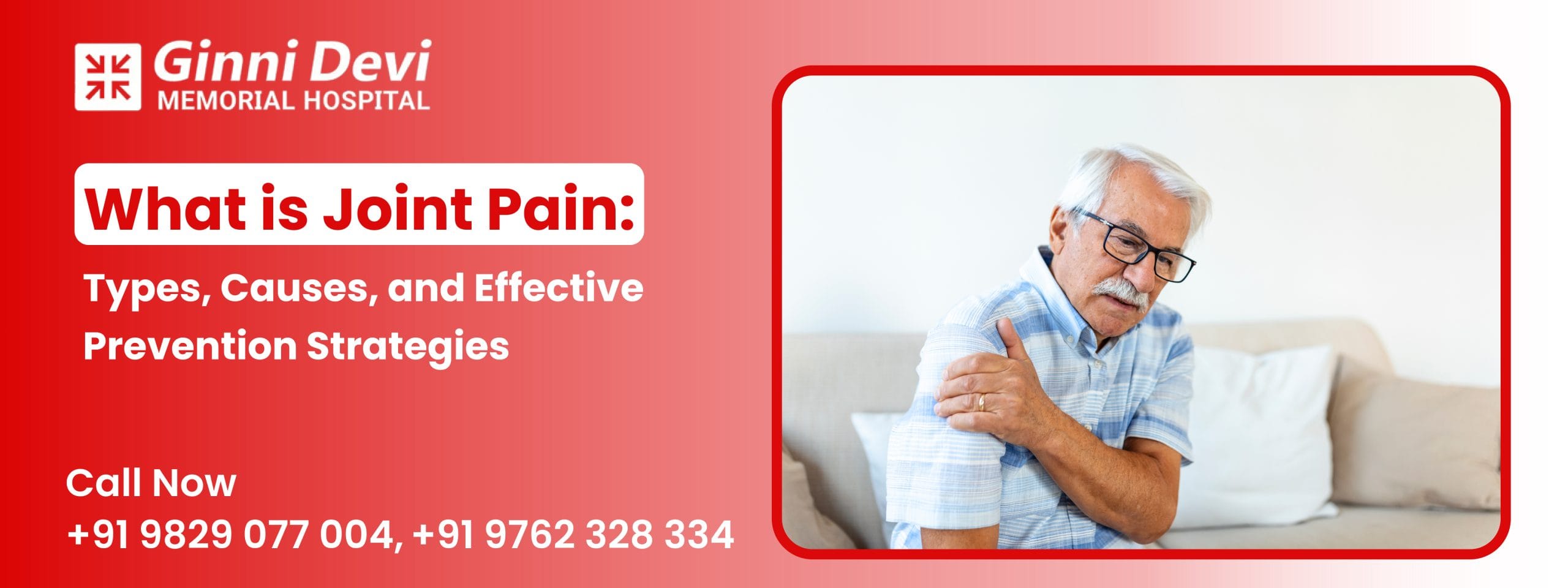Joint pain becomes a day-to-day complaint for people of all ages and backgrounds. Anything from a minor annoyance to severe discomfort can make daily tasks difficult. Joints are the connections between bones that facilitate movement, and when they become damaged or inflamed, pain and discomfort can occur. Consulting a joint replacement surgeon in Jaipur can provide individuals with the expertise needed for non-surgical and surgical treatment options, including hip, knee, or shoulder replacement.
So, let’s read further about this, which explores its types, causes, and effective prevention strategies.
What are the types of Joint Pain?
Joint pain can arise from various conditions that affect the different parts of the body, including the knees, hips, shoulders, and more. Individuals can address their joint pain more effectively if they are aware of the underlying causes of the pain. Sometimes it’s essential to speak with a Joint Replacement Surgeon in Jaipur, especially if you’re experiencing hip or knee pain. Here are the main types of joint pain:
- Osteoarthritis: it is known as wear and tear of the body. Certain joint parts, particularly the cartilage, may deteriorate as the body ages and as people age, it becomes more common. However, some people include those who are overweight, have a history of joint injuries, or have specific genetic predispositions that attract Osteoarthritis earlier. Also, it commonly affects the knees and hips requiring the best knee Replacement Surgeon in Jaipur.
- Rheumatoid arthritis: The immune system attacks the joints, causing swelling, discomfort, and inflammation. This disorder frequently affects several joints, such as the fingers, knees, and wrists.
- Gout: Uric acid crystals building up in the joints are the source of gout, characterized by abrupt, excruciating pain, often in the big toe. Other joints, including the elbows, ankles, and knees, can also be impacted by gout.
- Bursitis: It occurs when the bursae, small fluid-filled sacs that cushion the joints, become inflamed. This can result in pain and discomfort, especially in the shoulders, hips, or elbows. It is usually caused by repetitive motions or pressure on the joints and can lead to chronic pain if not treated properly.
- Injuries: some injuries result in joint pain if they are not treated. Such as sprains, dislocations, and fractures can cause long-lasting joint pain. If an injury fails to heal with non-invasive treatments, consulting a Joint Replacement Surgeon in Jaipur may be necessary to determine whether surgery is needed.
- Tendinitis: it is the inflammation of the tendons, the tissues that connect muscles to bones. It often results from repetitive motion or overuse and can affect areas such as the shoulders, elbows, knees, and hips.
- Ankylosing Spondylitis: it mainly affects the spine, though it can also affect other joints like the hips and shoulders. Inflammation brought on by the illness might result in discomfort, and stiffness which would significantly impair mobility. Joint pain can significantly impact daily life, but understanding its types and causes can help you seek timely treatment. For severe or chronic pain, particularly in weight-bearing joints like the knees and hips, An Orthopedic Hospital in Jaipur can provide specialized care and advanced surgical options to restore joint function.
What are the causes of Joint Pain?
Pain can occur from a variety of causes overuse to degenerative diseases, and other conditions, can result in joint pain. Following are a few typical reasons for joint discomfort.
- Osteoarthritis: The degenerative disease causes the cartilage between the bones to gradually deteriorate. As a result, there is friction between the bones, which hurts and makes you stiff and swollen. It is a common cause of hip and knee problems and a major reason for joint replacement surgery.
- Autoimmune diseases: these include conditions like Rheumatoid arthritis, Psoriatic arthritis, and Lupus. It results from an immune system attack on the joints. It can strike anyone at any age, most frequently teens and young adults, particularly women often requiring a consultation at Orthopedic Hospital in Jaipur. It is influenced by both environmental and genetic factors.
- Post-surgery complications: Pain after joint surgery, such as knee or hip replacement, can be managed by follow-up care with the Orthopedic and Ginni Devi Orthopedic Hospital provides you with the best hip Replacement Surgeon in Jaipur and the best aftercare.
- Gout: A form of arthritis that can cause sudden, severe attacks of pain in the joints, particularly in the knees and hips.
So, there are various other reasons too like if you have any injury trauma, or infection then it can also lead to joint pain. If the pain is consistent then you need to consult a joint Replacement Surgeon in Jaipur with the Ginni Devi Orthopedic Hospital provides you with the rightful guidance and leads to the best treatment.
What are the Effective Prevention Strategies of Joint Pain?
It takes a combination of lifestyle modifications, physical activity, and appropriate care to prevent joint discomfort. The following are some successful preventative techniques:
Keep Your Weight in Check
- Why: Carrying extra weight increases the strain on weight-bearing joints, such as the back, hips, and knees, and other joint discomfort.
- How: Go for a well-rounded diet full of fruits, vegetables, lean proteins, and healthy grains. Maintaining a healthy weight is aided by regular exercise.
Engage in Regular Exercise
- Why: Frequent exercise improves joint mobility and flexibility.
- How: Activities like Walking, cycling, and swimming are easy on the joints, building up the muscles, stretching and yoga maintain supple joints and increase the range of motion.
Maintain Proper Posture
- Why: Unnecessary tension on joints, particularly in the neck, shoulders, and back, can result from poor posture.
- How: When standing, sitting, or lifting heavy objects, pay attention to your posture. Avoid slouching and maintain a straight back and shoulders.
Drink plenty of water
- Why: Because water makes up a substantial portion of joint cartilage, maintaining proper hydration keeps the cartilage supple and flexible.
- How: Drink adequate water each day and refrain from consuming too many sugary or caffeinated beverages.
Wear Supportive Footwear:
- Proper footwear that provides adequate arch support helps lessen the strain on joints,
particularly the spine, hips, and knees.
So, to prevent joint pain you need a healthy lifestyle. Furthermore, managing a chronic disease like diabetes which may lead to joint pain, and avoiding harmful habits further leads to maintaining a healthy lifestyle. As far as before going into something the person needs guidance and proper procedure to follow. And if you want the best Orthopedic Surgeon in Jaipur then Ginni Devi Memorial Hospital is here for you. The doctors and staff are known for exceptional care and advanced treatment. If you want any information about the treatment then do visit Ginni Devi Memorial Hospital, Jaipur, and get yourself treated with compassionate care and world-class expertise.
FAQs
Q. How many types of joint pain are there?
A. There are several types of joint pain, primarily classified as inflammatory (rheumatoid arthritis), mechanical (osteoarthritis), traumatic (injury-related), and Neuropathic Joint Pain Other types include infectious, autoimmune, and metabolic ( gout) pain. Each type varies by cause and treatment approach.
Q. What prevents joint pain?
A. Maintaining a healthy weight to lessen joint stress, engaging in low-impact activities to strengthen the muscles, and practicing good posture, can also be supported by eating a balanced diet and drinking plenty of water.
Q. What causes joint pain all over the body?
A. It can be caused by conditions like rheumatoid arthritis, fibromyalgia, or lupus, which affect multiple joints or the entire musculoskeletal system. Infections, such as viral illnesses, or widespread inflammation can also trigger full-body joint pain.
Q. Joint pain causes in young adults?
A. Joint pain in young adults is commonly caused by sports injuries, overuse, or physical strain, leading to conditions like sprains, tendonitis, bursitis, and many other factors.




